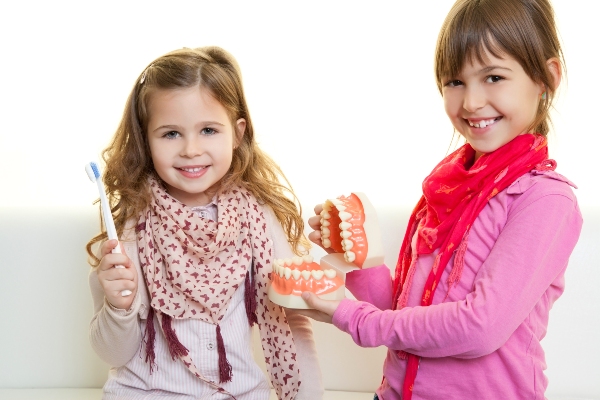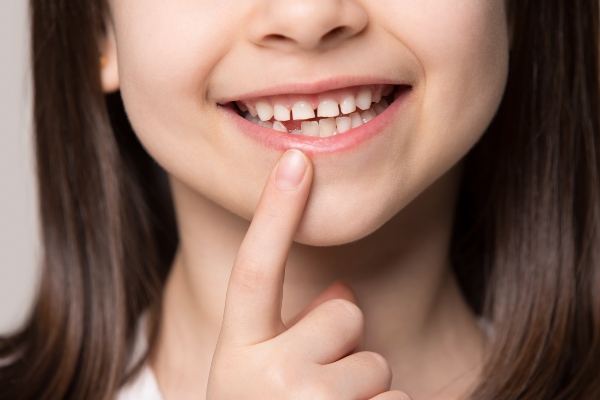What Does a Dental Exam for Kids Include?

A regular dental exam for kids is vital to safeguard your child’s oral health. The pediatric dentist will be able to diagnose any problems early, when treatment options are less invasive, and can also provide advice on how to keep your child’s teeth healthy. Although a child’s first dental checkup may seem frightening, it is beneficial for them to become acquainted with the dentist from a young age. This article covers what happens during a dental exam appointment for kids.
The steps of the dental exam
Brushing and flossing are essential, and so is going to the dentist every six months for a comprehensive evaluation and cleaning, starting either when the child’s first tooth comes in or no later than 12 months. Parents can ask questions about any changes or concerns that they have noticed during the examination. The steps include the following.
Dental exam and cleanings
The pediatric dentist will inspect the child’s teeth and gums during a dental exam to see if tooth decay or gum disease is present. An X-ray is sometimes used so the dentist can see the whole tooth, including the root.
Plaque (sticky film) and tartar (hardened plaque) will be cleaned from the teeth. This process is crucial because plaque can cause gum and tooth decay. Only the tools used by the child’s dentist can remove tartar. The dental professional will also talk about the child’s oral hygiene and diet. They may also show the child how to floss and brush their teeth properly.
Fluoride treatments
Fluoride is absorbed into the tooth enamel and makes teeth stronger and more resistant to decay. It has been shown to prevent cavities in children and aids in reversing the effects of tooth decay in its early stages. Fluoride treatments at the dentist’s office are quick and easy.
Fluoride is painted on the teeth at a greater concentration than what is found in fluoride toothpaste. For 30 minutes after the fluoride treatment, the child will not be permitted to rinse, eat, or drink. Fluoride treatments may be recommended every three, six, or 12 months, depending on the child’s oral health.
Dental sealant application
Sealants can help avert decay on the biting surfaces of a child’s teeth by providing additional protection. Dental seals fill and smoothen out the small grooves and crevices, making it more difficult for plaque and germs to accumulate and cause a cavity. Permanent teeth are more often sealed than baby teeth, but each patient’s needs are different. The dentist will prescribe sealants if they think that the child needs them. The process is simple and takes only a few minutes of a dental exam for kids.
A conditioning solution is administered to the teeth after they have been cleaned. The teeth are then dried after rinsing off the solution. After that, the sealant is applied, and it dries in a matter of seconds. Sealants have a three- to five-year lifespan.
The importance of scheduling regular visits to the child’s dentist
There are several important reasons to take children to get regular dental checkups. These include the following.
Avoid cavities and tooth decay
Cavities and dental decay affect everyone, but children particularly. With frequent dental checkups and a consistent oral hygiene program, the dental professional can spot problems before they develop into something serious. The possibility of developing cavities is lowered or even eliminated. When a dentist detects an issue early, it is easier to treat successfully.
Prevent crooked teeth
The primary teeth (baby teeth) provide the foundation for permanent teeth. This ensures proper positioning and spacing. Since the permanent teeth need room to develop and fit, alignment issues might arise if a child's oral health is neglected. If the dentist catches this early enough, they can recommend the proper intervention to prevent crooked teeth.
Help children learn proper oral hygiene
It is never too early to begin teaching a child the value of taking care of their teeth and gums. As soon as children reach the age of two, parents should start thinking about scheduling an appointment with the dentist. Parents can get advice on which toothbrush is best for their child's delicate gums. The child will also have a positive association with dental checkups and oral hygiene if parents take them regularly.
In conclusion
A dental exam for kids can occur biannually or more regularly, depending on the dentist’s recommendation. If you have not visited the pediatric dentist yet, reach out today to book an appointment.
Request an appointment here: https://www.grandparkwaypediatricdental.com or call Grand Parkway Pediatric Dental at (832) 579-0960 for an appointment in our Richmond office.
Check out what others are saying about our dental services on Yelp: Dental Cleaning and Examinations in Richmond, TX.
Recent Posts
An early dental checkup for kids can help give your child a good start in life. The pediatric dentist will perform a comprehensive dental exam. This can determine if your child needs early corrective dental treatments. Here are the benefits of an early dental checkup for kids.Children always want to feel comfortable. The early dental…
For a dental check-up for kids, as well as cleanings and restorations, parents frequently turn to their dentist. Bringing your child to a regular dentist is not always ideal, though. Every child should get the specialized care provided by a pediatric dentist, as they offer dental treatment for children from infancy through adolescence.Many parents are…
Brushing and flossing at home is a good start toward ensuring excellent oral health for your child, but you must not skip a pediatric dental check-up. Routine appointments are essential for preventing tooth decay and cavities. If you have concerns regarding your child's dental health, you can ask questions during the appointment. The pediatric dentist…
A child's first dental checkupDental anxiety and fear can begin at any age, but it can be a particularly difficult issue among children. The American Academy of Pediatric Dentistry recommends that you take your child to their first dental checkup within six months of the eruption of their first tooth. Starting the dental visits early…


